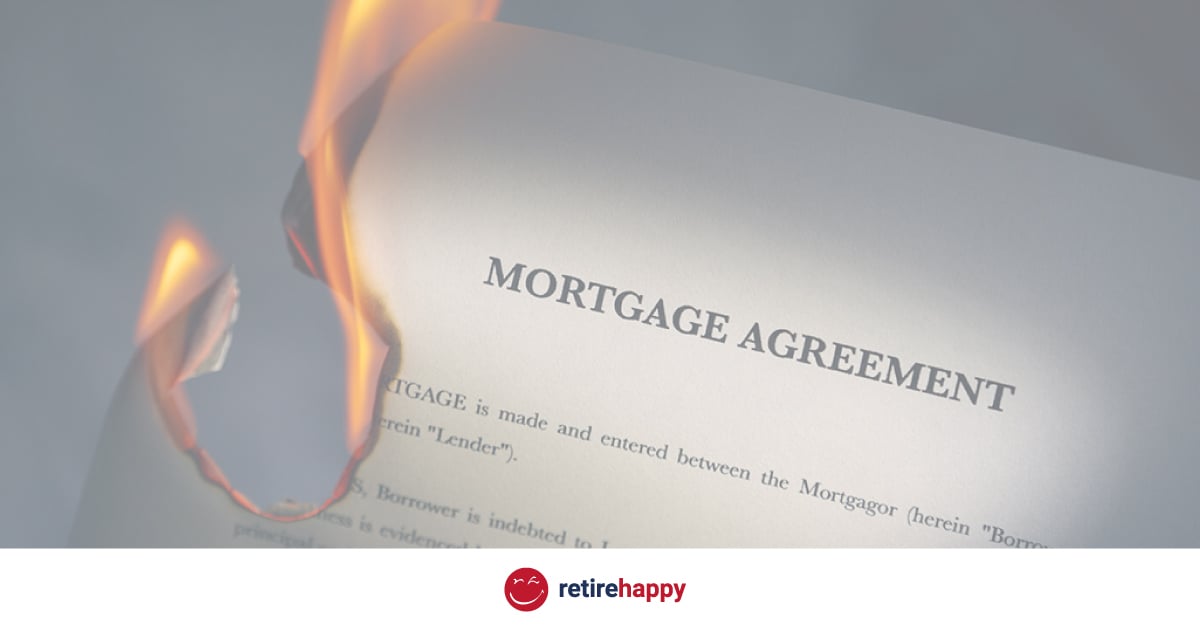Extreme mortgage burning: Pay your mortgage off early, save thousands

I was proud when we paid our mortgage off at age 49. It was years earlier than most people achieved, but fellow Retire Happy writer, Sean Cooper, beat us by 19 years!
Cooper bought his Toronto house at age 27 and became mortgage-free at 30. It wasn’t a shack either; his $425,000 house carried a $255,000 mortgage. So, how did he do that when most people take 25 years, or more, to do: burn their mortgage?
Cooper wanted to teach others how to get out from under mortgage debt so he self-published a book Burn Your Mortgage.
“I pretty much took it easy for six weeks and then I’m like, better start writing a book,” says Cooper, who works as a pension analyst and financial journalist.
When he was in mortgage-payment overdrive he also worked as a grocery clerk and rented out part of his house, jobs that netted him about $100,000 a year. He worked a hundred hours a week, which left little time for friends – or anything else.
Cooper’s book launched March 1 and has attracted a lot of attention – not all good. Cooper chose to make paying his mortgage off his life goal and worked those multiple jobs – what he calls side hustles. He also scrimped and pretty much gave up his life to achieve that target.
Cooper had his detractors. After CBC News reported his story, some derided his strategy. “What is he going to do next,” one reader chided, “buy a car and sell one of his kidneys to pay for it?”
Someone else called Cooper “the most boring man on earth. Life’s [too] short to live like a hobbit.”
Cooper has no regrets. “My mother was a single mother raising my sister and me,” he told me. “When she lost her job during the dot-com bubble and almost lost the family home, it taught me a powerful lesson.”
“I saw it as short-time pain for long-term gain. The payoff of financial freedom was well worth it. Now I have the rest of my life to enjoy without the stress of a mortgage holding me back. I can travel, leave my day job – do whatever I want.”
Cooper’s book offers many less extreme tips for readers. He realizes that very few are willing to sacrifice as he did.
Life can be stressful, especially when it comes to our finances. A massive mortgage can limit you from realizing your lifelong dreams, mainly financial freedom. It can stop you from accepting a less stressful job that you truly enjoy that pays less, traveling the world, or leaving the workforce altogether. The biggest fear of a homeowner is losing a job. You may not be particularly fond of your job, but you may stay there because you have a mortgage to pay. This can make you feel unhappy and trapped.
The book discusses all stages of the mortgage process — from saving for a down payment, finding a suitable property and chipping away at that debt. That’s where it’s useful, even if you’re not interested in making the sacrifices to pay your mortgage off really fast.
The biggest mistake people make, he says, is buying too much home. He points out that a house eats up your monthly cash flow for years to come, as a bigger house brings bigger bills for utilities, property taxes, and home insurance, plus the cost to furnish the home.
When shopping for a mortgage, Cooper cautions not to look only for a low-interest rate. He stresses that it also pays to land one with generous pre-payment privileges that can be key to wiping out a mortgage quickly. Once a year people usually can increase their mortgage payments and make a lump-sum contribution up to a specified limit.
“That’s where you can really knock off a huge balance from your mortgage and get it down really quickly,” says Cooper.
At mortgage renewal time, instead of just accepting your bank’s initial offer Cooper advises you to shop around and check rates on comparison websites. Take the best rate to your bank to see if they’ll match it. Even small interest savings can add up to thousands of dollars of savings in interest savings.
While I admire Cooper for what he’s achieved, very few people are interested in putting life on hold to pay a mortgage off in just a few years. I wasn’t.
Few of us have the willpower to scrimp and save Cooper-style. We want our stuff and we want it now so we sacrifice our future for those big-screen TVs, new cars and expensive vacations. I think that’s why some of the Cooper haters took their shots because their own finances embarrass them.
I think that the best solution is somewhere between Cooper thriftiness and spendthrift-ness. Everyone could learn lessons from Cooper. Canada’s debt-to-income ratio is at a record high, with the average Canadian owing $1.64 for every dollar of disposable income earned.
With his mortgage gone, Cooper is working on his next big goal — investing all that money that no longer goes toward mortgage payments. He aims to become a millionaire by the age of 35. And then perhaps he’ll take some time out. Or maybe that will be the topic of his next book.
You can find Burn Your Mortgage: The Simple, Powerful Path to Financial Freedom for Canadians for sale on Amazon.ca.

Comments
When you buy a house your first payment to the bank is nearly all interest. One penny came off the principal on my last house for first payment.
My thought/question is this. When I buy my next house I will hold back $10,000 of my down payment and then make a lump sum payment before my first payment. This will increase the $$$ towards my principal. Will the difference in amount borrowed offset this?
I could also hold back $20,000. 10K to lump sum and 10K to add to my regular payment. ( principal only)
Your thoughts?
Jim: One thing my husband and I didn’t do was touch any of the “pre-payment” amounts that the bank was only too happy to let us access for renovations…the statement looks like it is free money we can access easily, but it would have put us years back in paying off our mortgage.
I have +$20,000. in a chequing account that I would like to make a little interest on, while still being to access when needed…do you know where I could park this for a little while and make some $$?? Would like it to be CDIC insured.
Nancy,
Google CDIC and find what is covered. You will be disappointed in the returns and you may want to apply your cash to the mortgage.
Because of your extreme security bias, nothing else will be attractive for you.
But…
Use TMXMoney or Google|Finance screeners and look for funds that Yield 8% or more, then study the results.
Best thing I did was to pay off extra to the principal every month and we were debt free in 8 years from a 30 year mortgage. Best feeling in the world 🌎 We were just 30 years old!! Praised God!!
We paid off our mortgage when we were 31 and 32 years old. We were one of the lucky ones who were able to do that. No help from family nor lottery. Just hardwork and frugality. It can be done but few people nowadays are willing to give up a little comfort for their future security.
Rick,
If the extra 20k allows you to get a cheaper interest rate, then it is best to get the cheaper interest rate rather than to hold back and pay as lump sum. As the interest rate is applied on a pretty big amount, even a .2% difference could mean a few hundred dollars per year which you can add to the mortgage
Motivation, past personal experiences, personality, goals, interest rate environment, etc.
These are different for everyone.
I paid off a 75% mortgage in a down trend interest environment, in 42 months. I took a variable rate mortgage but paid the 5-year rate (13%) amount regardless of my actual mortgage payment. Probably couldn’t do this today.
The article outlines what had to be done to pay down the mortgage so quickly, and that is the most valuable part of the article. Most people won’t do that.
Personally, I look to make money rather than pay down inexpensive debt like a mortgage. For instance, getting another job is very expensive when income tax time rolls around.
I would look to generate tax-advantaged income like dividends, use a Margin account sparingly to write-off the interest and generate additional tax-advantaged income. The lessons learned to obtain this type of income will last a lifetime.
To Rick:
Your down payment does two things for you. One: it reduces the original amount as you know. This will in turn reduce your interest expense. The second thing it does is eliminate mortgage insurance which is can be as high. Even at 1% it can affect your cashflow. So, it is better to make a down payment.
So happy for him. He’ll be millionaire before the age of 33 and with that much time in his disposal, I hope he’ll find ways to leverage equity build up with his property. I hope him success for his book as well.
Thank you for sharing this story of success.
I used 15%+15% formula, which every bank offers with mortgage and paid off my over $320K mortage in four years and 3 months.
Saved over $100K on interest payment. we are just regular working class family. sending two kids to university at same.;time.
Sorry… can you explain 15%+15% formula?
In terms of the article, that’s great for 5+yrs ago.
What about now? Just got a mortgage for 785k (house 880k in Georgetown), both combined make 145k a year… which is by far average family income. She works in mississauga I work in Toronto. Even if we were frugal, I dont see it paid in 10-15yrs. Considering if we have kids… which will set us back ~1.2k a child…
The same money invested would have most likely yielded more than your mortgage interest rate. In that case it is not the best move financially although I do get the appeal of being mortgage free.
He’s lucky he didn’t die of fatigue and stress while working 100 hours a week to pay off his mortgage. He should feel lucky to be alive, healthy and well… richer than the average Canadian.
But his next goal of becoming a millionaire by 35 has no guarantees. Life has no guarantees. He doesn’t realize he’s chipping away the BEST years of his youth to have lots of money… time that he’ll never get back in his life. They say “respect time, it’s more valuable than money”. What if he dies tomorrow (good forbid he does and I don’t say he should or will), what’s the point of all that money?? Remember ppl like Steve Jobs or even Kobe Bryant who’ve gone so early in life. So much wealth and didn’t get to enjoy much of it. Think about it and learn to create a balance in your life.
He would probably be a millionaire already if he didn’t prepay his mortgage and invested those extra payments instead.
You could have those thousands of dollars working for you in the market.